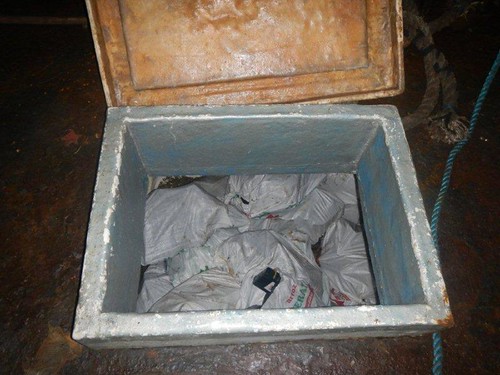Ayush Sharma, a 25-year-old truck driver from Ontario, has quietly pled guilty in a U.S. court to his involvement in a large-scale drug smuggling operation that funneled significant quantities of cocaine and heroin into Canada. Sharma, an Indian national working in Canada on a temporary permit, was arrested as part of “Operation Dead Hand,” a major investigation by U.S. and Canadian law enforcement that targeted an international narcotics ring linked to Mexican cartels, American drug traffickers, and Mafia-connected figures in Montreal.
Sharma’s role in the drug ring involved driving an 18-wheeler truck across the U.S.-Canada border, transporting illegal drugs from Los Angeles to Montreal. His arrest came as part of an elaborate undercover operation, where he was caught delivering 19 kilograms of cocaine to a garage in Montreal in December 2022. The delivery process was closely monitored by law enforcement, who had infiltrated the drug operation and were surveilling Sharma and his associates. He was arrested with the drugs in his vehicle, and crucial identification evidence in hand, in the form of a marked Canadian $20 bill used to verify deliveries.
The cross-border drug ring, which operated between Mexico, the United States, and Canada, is accused of smuggling massive quantities of cocaine, methamphetamine, and heroin northward into Canada. The syndicate’s operations involved sophisticated logistics, including using long-haul trucks to move the narcotics across the U.S.-Canada border. A branch of the operation supplied drugs to Ontario, while another targeted Quebec, with Sharma being part of the latter operation.
The U.S. Department of Justice revealed that Sharma was one of 15 individuals charged in the two indictments related to Operation Dead Hand, which was announced in Los Angeles in January. Five of the accused were based in Canada, and while many of his co-conspirators are still fighting extradition or remain at large in Mexico, Sharma opted to waive his extradition and face trial in the United States. He was transferred to the U.S. in March 2024, after a Brampton court denied his bail due to concerns about his ties to a powerful criminal network and the potential risk of flight.
Despite having no previous criminal record, Sharma faced significant legal hurdles during his bail hearing in Canada. Justice David E. Harris, in denying Sharma’s bail, expressed concerns about the resources and reach of the drug operation that Sharma worked for, suggesting that the organization had access to significant funds and that Sharma could potentially have hidden assets. Harris noted that while the allegations were based on limited direct evidence, the scale of the operation and Sharma’s involvement in prior drug smuggling trips made him a flight risk.
Sharma’s decision to plead guilty came just six months after his extradition to the U.S., and his plea agreement was signed in September. By pleading guilty to one count of conspiring to distribute and possess with intent to distribute cocaine and heroin, Sharma avoided facing trial on three other charges, which the government agreed to dismiss in exchange for his cooperation. However, Sharma’s U.S. lawyer, Marilyn Bednarski, emphasized that his quick plea deal did not indicate any intention to testify against other members of the drug ring. According to Bednarski, Sharma is not expected to serve as a witness for either the prosecution or the defense in any future court proceedings related to the operation.
Sharma’s guilty plea guarantees a reduced sentence, though the exact range is still to be determined. The maximum penalty for the charges against him is life imprisonment, but under the terms of his plea deal, Sharma is expected to face between 7.25 and 9 years in prison. The government has agreed not to oppose a sentence within this range, and Sharma has waived his right to appeal as long as the sentence falls within the agreed-upon limits.
The arrest of Sharma and the dismantling of the drug ring come amid heightened efforts by law enforcement in North America to combat transnational narcotics smuggling operations. The ring Sharma was involved in used highly organized methods to transport drugs from Mexico into the United States, where they were stored in stash houses around Los Angeles before being loaded onto trucks destined for Canada. Once in Canada, the drugs were distributed through various networks in Ontario and Quebec.
Sharma’s arrest was part of a broader crackdown on drug smuggling operations with similar methods. In a related case, former Canadian Olympic snowboarder Ryan Wedding is alleged to have been involved in a separate but parallel operation that smuggled cocaine into the United States and used Canadian truck drivers to move it across the border. Wedding remains a fugitive, and U.S. authorities have offered a $50,000 reward for information leading to his arrest.
While Sharma’s guilty plea marks the latest development in Operation Dead Hand, the investigation continues, with many of his co-accused still at large or awaiting extradition. Among the high-profile figures linked to the smuggling ring are Roberto Scoppa, a Montrealer with ties to the city’s Mafia, and Eduardo Carvajal, an alleged Mexican cartel leader known as “Primo.” Both are believed to be key players in the operation.
As Sharma awaits his sentencing, set for January, his case has drawn attention to the broader issue of cross-border drug trafficking and the role of long-haul truckers in transporting illicit drugs between countries. Sharma’s quick decision to plead guilty and accept responsibility for his role in the operation may spare him a longer sentence, but his involvement highlights the complexities and dangers of international drug smuggling rings that stretch across multiple continents and involve some of the most powerful criminal organizations in North America.










Leave a Reply